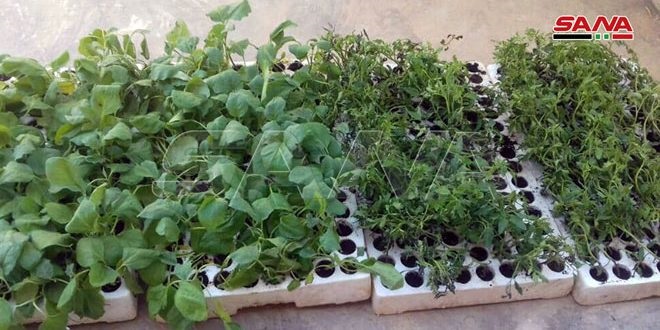Home Gardens Project Promising Approach to Enhance Household Food Security, 1880 New Beneficiaries in Damascus Countryside for 2020
Our mother earth is going through a very tough situation . We are destroying our environment consciously or unconsciously. We have to act very smartly and plan something to sustain what we still have. We have to think about our future generations well, so that they get all necessary support from nature to lead a healthy life.
Gardening is always an excellent and environment friendly idea. Growing your own food is always good.
Home gardens project aims at improving the income level of poor rural families and reinvesting agricultural lands, in addition to manufacturing the surplus agricultural production and introducing it in the market at competitive prices.
The project, which is being carried out by the World Food Program ( WFP ) and the Federation of Syrian Chambers of Agriculture in cooperation with the Ministry of Agriculture and Agrarian Reform consists of the summer and winter agricultural seasons in addition to food processing units and poultry farming.
Head of Damascus Chamber of Agriculture Eng. Omar al-Shalet told SANA that the project kicked off in 2017 in 6 regions in Damascus Countryside province , including Yabroud, Rankous, and Qatana as a first stage, and the number of beneficiaries of the project reached 685, while the second phase included Zabadani area , Madaya and Bu’kin , while the third phase included Ghouta after liberating it from the terrorist gangs in the regions of Douma, Harran al-Amamid, and al-Kiswah. The number of beneficiaries of the three stages reached 2800.
Al-Shalt indicated that the implementation of the fourth phase of the project included 1880 rural families in the eastern Ghouta , Al-Nashabiyeh area and part of Douma with 500 families for each area whom they will be provided with all components of the project.
He explained that the components include a 500-square-meter drip irrigation network , summer vegetable seedlings, as well as winter seeds in addition to 5 kg of balanced fertilizers and agricultural medicines.
With regard to the food processing unit, Al-Shalet pointed out it aims at manufacturing the surplus from of the home garden production including pickles, jams and dairy products to be sold in the local markets in a way that ensures an income of the families.
He underscored that the number of the units reached 16 units which serve 80 families.
Concerning the poultry farming , Al-Shalet said that 300 families were selected for the project as they were supplied with the equipment to carry out the project.
It is noteworthy that the project is one of the micro-agricultural projects which contributes to achieving self-sufficiency for the targeted families of summer and winter vegetables and eggs, and providing a source of income for the beneficiary families through selling their production in the local markets.
Rawaa Ghanam

